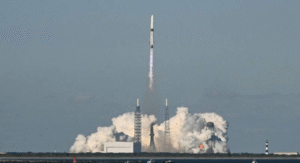Pakistan and China to Deepen Space Cooperation with Five-Year Action Plan
Pakistan and China have agreed to expand their cooperation in space sciences and technology, focusing on astronaut training and the establishment of a Pakistan Space Center. The initiative is part of the Action Plan (2025–2029) for a closer China-Pakistan partnership in the new era.
Advancing Joint Space Programs
Both countries reaffirmed their commitment to implementing the 2021–2030 Space Cooperation Outline Program, signed between the China National Space Administration (CNSA) and Pakistan’s Space and Upper Atmosphere Research Commission (SUPARCO).
This includes continued collaboration on lunar and deep space exploration, with joint assessments of the International Lunar Research Station (ILRS). Such efforts mark Pakistan’s growing role in international space projects alongside China’s advanced capabilities.
Astronaut Training and Human Spaceflight
A key element of the new action plan is the joint selection and training of astronauts, which could pave the way for Pakistan’s participation in future human spaceflight missions. This cooperation would place Pakistan among the select few nations preparing for manned space endeavors.
Establishment of Pakistan Space Center
Discussions also emphasized the creation of a Pakistan Space Center, envisioned as a hub for research, development, and application of space technologies. The center is expected to boost Pakistan’s capabilities in areas such as satellite development, space applications, and innovation-driven economic growth.
Access to China’s Earth Observation System
Under the plan, Pakistan will gain access to the international version of the China Platform of Earth Observation System (CPEOS). This access will enhance capabilities in agriculture monitoring, disaster prevention, climate change tracking, water resource management, and urban planning through advanced remote sensing technologies.
Strategic Significance
Both countries highlighted that cooperation in space science is not only mutually beneficial but also strategically significant. It complements traditional collaboration in areas such as trade, defense, and infrastructure while expanding into frontier domains.
Prime Minister Abiy Ahmed emphasized that space technology is vital for economic modernization, and China’s support will accelerate Pakistan’s transformation in science and technology.













